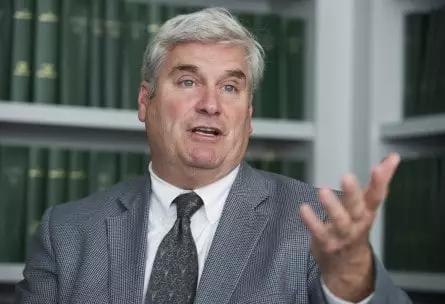The appointment of Congressman Tom Emmer as Vice Chair of the House Subcommittee on Digital Assets, Financial Technology, and Artificial Intelligence marks a significant shift in the U.S. legislative landscape concerning cryptocurrencies. Announced on January 14 by Committee Chairman French Hill, this new position places Emmer at the forefront of discussions that will potentially guide U.S. policy on digital assets in the coming years. His recent comments express an optimistic outlook, particularly regarding the political environment under President-elect Donald Trump. Emmer reflects a belief that this administration could capitalize on advancing American values in the cryptocurrency sector.
With the establishment of the Digital Assets Subcommittee in 2023, the overarching goal to maintain U.S. leadership in technological innovation has been firmly set. Emmer has always been a staunch advocate for a regulatory framework that promotes innovation rather than stifles it. By opposing stringent federal regulations on digital assets, he aligns with the industry’s demand for clarity and constructive guidance. His notable initiatives, particularly the CBDC Anti-Surveillance State Act, limning the Federal Reserve’s control over potential digital currencies, not only emphasize his commitment to privacy rights but also signal an intent to curb government overreach.
Another essential aspect of Emmer’s mission with the new subcommittee is consumer protection and ensuring that investors feel secure in their transactions. As financial technology continues to evolve, the balance between innovation and regulation becomes increasingly delicate. Emmer’s efforts to optimize regulations for community banks and ensure regulatory compliance also hint at a broader intention to enhance the stability of the U.S. financial system as a whole. Without stringent oversight, the risk of fraud or instability could undermine consumer confidence and hinder broader adoption of cryptocurrencies.
Emmer’s vocal opposition to former SEC Chair Gary Gensler epitomizes the current friction between advocates for innovation in the cryptocurrency space and regulatory bodies. Gensler’s tenure has faced ongoing criticism, with Emmer branding it as particularly detrimental to the industry. This antagonism underscores a critical dialogue regarding how regulatory frameworks can evolve without stifling the burgeoning growth of digital assets. As Congress prepares for potential legislative changes under Trump, the call for a balanced approach that fosters innovation while still protecting investors will be pivotal.
The political winds appear to be shifting in favor of the digital currency narrative, with significant movements in both the House and Senate aimed at supporting the crypto industry. Emmer’s recent appointment could ignite further discussions that lead to actionable policies that cement the U.S.’s role as a global leader in digital assets. With President Trump poised to sign key executive orders addressing crypto-related issues soon after his inauguration, the groundwork is being laid for what could be a watershed moment in U.S. cryptocurrency policy. The synthesis of political will and regulatory foresight will ultimately determine the trajectory of the digital asset industry in America.
















Leave a Reply